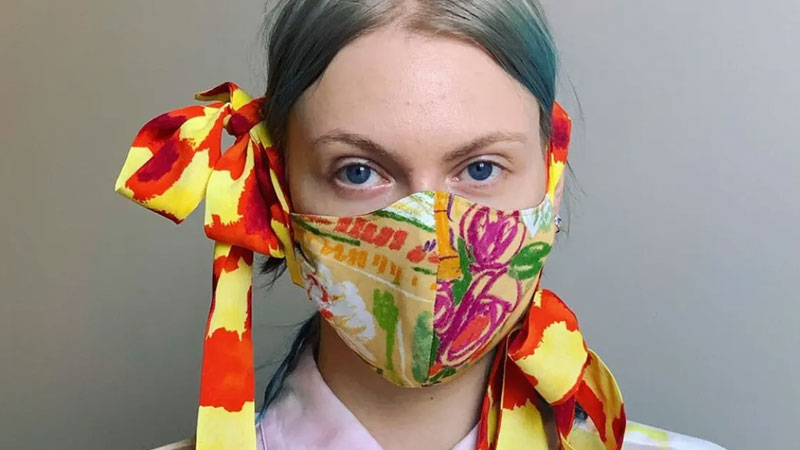
“Facial expressions are an important mode of communication and play a pivotal role within the interaction,” says Johannesburg-based psychologist Sanam Naran.
“We can miss meta-communication via facial expression due to wearing masks.
The tone of voice becomes more important. So does body language.”
The good news is that the eyes really are the windows of the soul, and we’ve still got those to count on (if you’re someone who pairs dark shades with your mask, it might be time for a rethink).
“Our eyes crinkle when we’re happy, they tear up when we’re sad,” says Dr Tracy Vaillancourt, a professor in the School of Psychology at the University of Ottawa, Canada.
“We roll our eyes to show contempt. We narrow them to show suspicion and widen them to show concern. Sure, we’re losing some information by not being able to see people’s full faces, but the bulk of what we need to know about how someone is feeling comes from their eyes.”
Even in the age of Botox, most people furrow their eyebrows when they’re annoyed and raise them when they’re scared or surprised.
“If you’re relying on the mouth and not paying attention to the eyes in a typical conversation, even without a mask,” says Dr Vaillancourt, “you’re likely not getting the full story.”
Mask up, then speak up—your new COVID-mantra Masks, though, have entirely eliminated the ability to rely on the mouth, something many of us do, even unconsciously, to fill in the blanks in a conversation.
It can be harder to hear someone’s voice from behind their mask—or to have a conversation with a person without looking directly at them.
Talking with someone now requires our full attention (in my opinion, not a terrible thing).
Looking at a person while chatting makes it easier to hear and understand them, while also providing additional visual clues to how they’re feeling, such as how they’re sitting or standing.
“For example, if an individual is sitting with their arms or legs crossed, this can communicate a resistance to being open to what is being said,” says Naran.
“Or if individual A is sitting in an opposing direction to individual B, yet they are in conversation, this can communicate that individual A is uninterested or uncomfortable.”
If a person uses their hands excessively through conversation, meanwhile, they may be experiencing feelings of anxiety.
Complicating things further is the fact that more of us are communicating digitally, which can be a barrier to true understanding even when the masks are off.
To compensate, says Jennifer Dorman, a Berlin-based sociolinguist at language learning app Babbel, “gestures have to be performed in a more exaggerated and obvious way, since we cannot always rely on eye contact with delays to video calls.”
She suggests experimenting with Zoom, widening and tightening the camera frame.
Typically, wider shots that show more of the body will allow for better communication, even if it then becomes harder to make eye contact.
“Instead of just part of the picture,” she says, “we now get the whole thing.”
For all of these reasons, says Naran, it’s more important than ever to convey to people verbally the way we truly feel.
In other words, make ‘speak up’ your new Covid-mantra (after ‘mask up’, of course).
The reasons for this go well beyond understanding someone in the moment.
“Depression, anxiety, and substance abuse may stem from many factors, although one of them may be an inability to express feelings and emotions, thus, bottling them up,” she says.
“Conversation is going to be an important method of reparation during these times, which will prove beneficial in the long run, as many people have struggled with conflict resolution and expressing their feelings through conversation.”
Keep the windows to your soul firmly open An increased reliance on eye contact, meanwhile, will also serve us well post-COVID.
“Something beautiful I’ve noticed during this time is that in order to connect, we require much more eye contact,” says Sheleana Aiyana, founder of Rising Woman, a relationship and spirituality advisory based in Vancouver, Canada. “I love seeing folks smile at one another with their eyes.
But, of course, one of the best ways to know what a person is feeling is to ask them.”
And sometimes, you’ll just have a good sense, even without knowing for sure.
Lina Khalifeh, founder of SheFighter, a Middle East self-defence school for women, believes strongly in the power of reading the energy in the room.
“Every human being has a field of energy and if you’re sensitive enough, you will feel it,” she says. “Words are important, but energy can often speak louder than words. Life has to be lived using all senses and that includes the sixth sense, too.
” That is, in the absence of all the clues, mask or no mask, sometimes it all comes down to simply trusting your gut.
Stay tuned for the latest news on our radio stations


